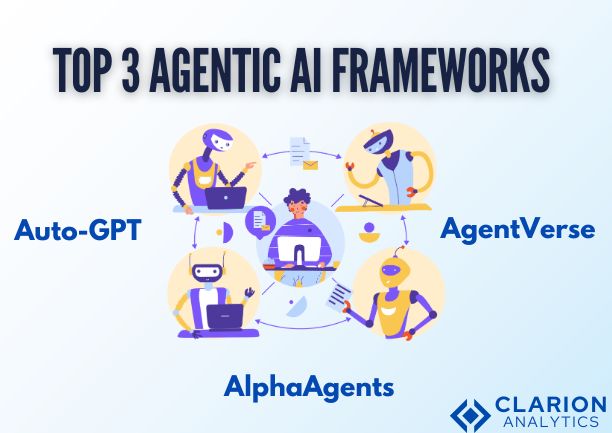
Artificial Intelligence is rapidly evolving, and 2025 marks a significant shift towards Agentic AI—AI systems capable of autonomous decision-making, goal-driven reasoning, and self-improvement. Unlike traditional AI models that rely on predefined instructions, agentic AI frameworks empower AI agents to plan, adapt, and execute tasks dynamically with minimal human intervention.
1. OpenAI Auto-GPT++
What Makes Auto-GPT++ Stand Out?
Auto-GPT served as a base for OpenAI’s development of Auto-GPT++ which elevated autonomous agentic AI agent capabilities to their highest point in 2025. This system improves goal-based task execution through the combination of multi-agent collaboration and dynamic memory together with self-refinement procedures. Auto-GPT++ allows AI agents to function effectively in operational business and research conditions beyond their existing predecessors’ capabilities.
Key Features
The AI system gathers knowledge from completed previous tasks to build better strategies throughout its operational history.
The program enables smooth accessibility for external APIs databases and it allows real-time access to data sources.
The system conducts autonomous evaluation of its production outputs while independently adjusting these outputs for improvement.
Multiple agentic AI agents can cooperate with each other through multi-agent collaboration to handle complex projects.
Are you intrigued by the possibilities of AI? Let’s chat! We’d love to answer your questions and show you how AI can transform your industry. Contact Us
Real-World Applications
The industrial use of Auto-GPT++ encompasses full process automation that requires lower human involvement across financial services as well as human resources management and operational functions.
Research scientists employ Auto-GPT++ to produce automated research ideas and conduct experimental analyses.
Businesses utilize it to develop independent chatbots which automatically improve customer service levels beyond human monitoring.
Why It Matters
Auto-GPT++ represents a major step toward fully autonomous AI systems that are not just task executors but strategic thinkers capable of complex decision-making.
2. Meta AgentVerse 2.0
The Next Level of AI Autonomy
Auto-GPT served as a base for OpenAI’s development of Auto-GPT++ which elevated autonomous AI agent capabilities to their highest point in 2025. This system improves goal-based task execution through the combination of multi-agent collaboration and dynamic memory together with self-refinement procedures. Auto-GPT++ allows AI agents to function effectively in operational business and research conditions beyond their existing predecessors’ capabilities.
Key Features
The AI system gathers knowledge from completed previous tasks to build better strategies throughout its operational history.
The program enables smooth accessibility for external APIs databases and it allows real-time access to data sources.
The system conducts autonomous evaluation of its production outputs while independently adjusting these outputs for improvement.
Multiple AI agents can cooperate with each other through multi-agent collaboration to handle complex projects.
Real-World Applications
The industrial use of Auto-GPT++ encompasses full process automation that requires lower human involvement across financial services as well as human resources management and operational functions.
Research scientists employ Auto-GPT++ to produce automated research ideas and conduct experimental analyses.
Businesses utilize it to develop independent chatbots which automatically improve customer service levels beyond human monitoring.
3. Google DeepMind AlphaAgents
A Breakthrough in Multi-Agent AI
AlphaAgents, a ground-breaking multi-agent reinforcement learning (MARL) framework from Google DeepMind, is intended to address complex, real-world problems. It is perfect for complex industries because it enables AI agents to collaborate, learn from one another, and solve problems as a group.
Important Features
Multi-agent coordination: To accomplish common objectives, agentic AI agents cooperate and bargain.
Advanced strategic planning: Able to think long-term in uncertain situations.
Making decisions on one’s own in situations with significant stakes: utilized in security, logistics, and finance.
Scalable AI solutions: Manages AI applications at the enterprise level that call for agent coordination.
Applications in the Real World
Autonomous Financial Trading: Self-learning trading bots that adjust to changes in the market are powered by AlphaAgents.
Smart supply chains are used by businesses to manage inventories and logistics more efficiently with less human intervention.
Why It Matters
AlphaAgents represents a move toward multi-agent intelligence, in which AI systems collaborate like human teams to solve extremely difficult problems on a large scale.
Conclusion: Agentic AI’s Future
A new era where AI does more than just help—it acts, plans, and improves on its own—begins with the emergence of agentic AI frameworks in 2025.
Auto-GPT++ encourages AI to become more adaptive and self-improvement-oriented.
AgentVerse 2.0 improves personal AI assistants and human-AI collaboration.
Multi-agent collaboration and strategic decision-making are redefined by AlphaAgents.
These agentic AI frameworks are paving the way for autonomous enterprises, AI-driven decision-making, and next-gen digital assistants, ensuring that AI plays a more significant role in shaping our future.
Also Read:
To fully understand modern Agentic AI, it’s important to explore Understanding the Structure of Agentic AI: A Comprehensive Guide, which breaks down the architectural foundations behind today’s intelligent systems. Emerging developments are highlighted in AI Agents Unleashed: Top Revolutionary Trends in Agentic AI for 2025, offering insight into how these systems are evolving. A clearer conceptual perspective is provided in Agentic Agents vs Agentic AI: Crucial Differences and Their Revolutionary Impact, helping readers distinguish between autonomous agents and traditional generative models. For implementation and orchestration, Autonomous Agents Accelerated: Smarter AI with the Model Context Protocol explains how multi-step reasoning and execution are managed. Developers can build practical applications through Unlock the Power of LangChain: A Comprehensive Guide to Building Custom Chatbots, while Mastering Mitigation of LLM Hallucination: Critical Risks and Proven Prevention Strategies ensures reliability and accuracy in large-scale Agentic AI deployments.
Are you intrigued by the possibilities of AI? Let’s chat! We’d love to answer your questions and show you how AI can transform your industry. Contact Us
